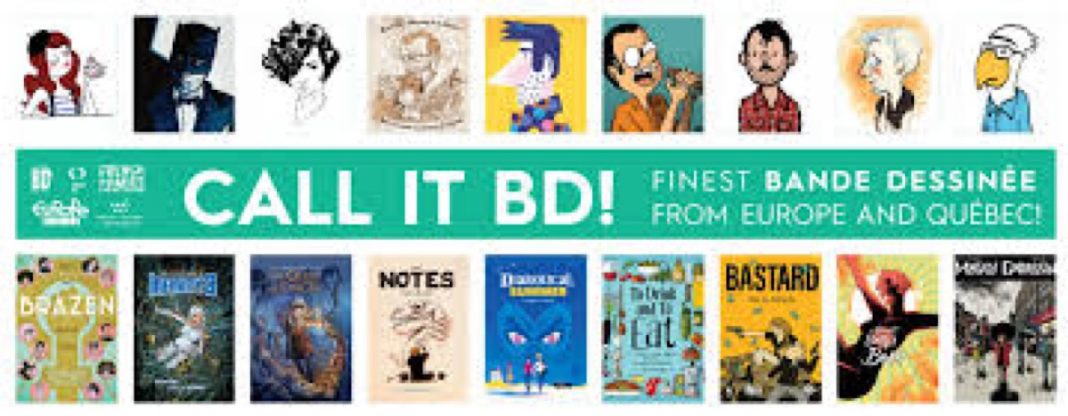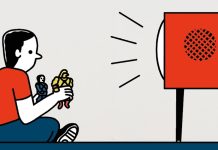When it comes to how women are represented in comics, French artist Penelope Bagieu (Brazen: Rebel Ladies Who Rocked The World, California Dreamin’: Cass Elliot Before the Mamas and the Paps) has some pretty strong opinions. Maybe it’s because she never had the female role models she wished to see as a child. Or maybe the time just happened to be ripe with the Me Too movement where her voice would resonate with readers. Or maybe it’s that short, clipped narrative style as reader’s eyes dance across her charming illustrations that somehow suck them in and leave them yearning for more. Or maybe it’s a girl standing in front a boy, asking him to respect her and give her her due.
The Beat got the privilege to interview this remarkable creator at NCS Fest, where we caught up with Penelope on the opening night of the festival.
Nancy Powell: I hear you are sharing the stage with the Hernandez Brothers and Daniel Clowes. How did you end up on that?
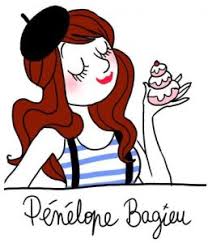
I remember reading Locas, and it was really an epiphany for me because that was the first time that I was reading actual female characters with a real life, a real psychology and that was so accurate. I felt so close to them and the ups and downs of their lives. And before that the other book that I had seen was Ghost World. So really, being on a panel with all of them is super intimidating on the one hand. Also, I have no idea what I’m doing here, like the intruder in the middle of these people. But I am extremely honored and I can’t wait to hear them. I will probably not talk at all and just listen. It’s going to be awesome.
But to answer your question I don’t know how I got there. I think you have to believe in your good stars. That’s how it ended up on a panel with them.
Powell: Do you have a favorite Hernandez Brothers book?
Bagieu: Well, all the Locas series, anything about Hopey Glass, I think. I bought this super edition of Luba that I intend to have signed, actually. But yeah, I don’t know how it is published in the U.S., but in France we had these big collections of Locas published, and I got all the big books. And the fact that you can follow these women for so many years, you almost grew up with them.
Powell: Do you have a favorite Daniel Clowes book?
Bagieu: Of course, I love Ghost World, but I really liked Patience. It was so surprising. It was cunning in the way the stories turned out. It really, really is a masterpiece for me in storytelling. I also love his solo art work. I have an original drawing from him that I bought, and I have the coolest thing in the world…a Bill Murray portrait. How can it be cooler? And it’s a very large drawing like this, and it’s in my living room.
Powell: That’s awesome!
Bagieu: Yeah. If there is a fire in my house this is definitely what I’m taking!
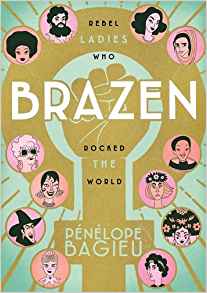
Bagieu: After we finished California Dreamin’, I was not done with telling stories of women who have inspired me. But then I thought, I’m not going with another 300-page about someone again because there are so many of them, and I don’t want to spend my life writing only biographies. So I thought let’s put them all in one book and then I’m done with this biography chapter. which I’m not, by the way. Anyway, I thought let’s list them. Let’s list maybe five women that have really inspired me over the years. But then I started my list and after a few minutes I realized I had already ten of them. And fifteen. And twenty. I thought, okay, this is never gonna end, so I decided for the totally random number of thirty. And I thought, let’s stick to that.
I started listing the ones that I felt the closest to. It was not really about the big actions. Some of them are queens and some of them got awarded with the Nobel Prize for Peace. But some of them saved the lighthouse. And so the range of action wasn’t really what I wanted. It was stories that I love to tell over and over again and also in a very vain way. I want to pick the ones that would make people say, “How come I have never heard of them before?” That was really another thing I wanted to achieve. I wanted to pick the ones that are usually not considered having their stories told. I wanted to surprise people.
And because they’re very short stories, it was more like teasers. I wanted people to be kind of frustrated and know more about each of them, do their own research afterwards, if they want. So that’s why it’s short; it’s four to eight pages.
Powell: Did you have a favorite person in the book?
Bagieu: Not favorite because I really love all of them for different reasons. Again, because I feel very close to them all in the way they had to react. Or some of them are just role models because I’m always thinking they had to deal with so much more than what I am dealing with. And they found a way. Even back in eras where women had less rights than adults, they found a way. So that is very inspiring.
But the ones that are my childhood figures, I kept them for the end of the book. Katia Krafft, the volcanologist, was really my childhood icon. And that was so intimidating that I thought, I’m going to start with ten or fifteen others. Yeah, I remember really being blown away as a kid seeing a woman climbing on volcanoes. And she was the only woman doing that. I didn’t even know people were actually going inside volcanoes, but then there was this tiny woman doing this, and it opened so many doors in my head, like this is positive! Then I Iearned more and more about her life, and she was so inspiring.
And same thing with Peggy Guggenheim that I’m finishing the book with. I had love-at-first-sight for her story. When I got to hear about her and the life that she led, I thought this is this is how I want to be. Where were these stories when I was growing up, and I was I had to identify to male cool people? Where were the women when I was a kid? They were nowhere to be found. The girls were damsels in distress or the wicked, poisonous, toxic women…but cool, kind, brave, female role models? I really liked that as a kid.
I see so many great comics for young readers, especially young girls. And I am reading them with a very suspicious eye, trying to find every annoying trope about female characters. There are none of them. You can tell that these books are actually made by women. You can tell the way the characters are portrayed and what they have in mind, that they care for how are girls going to absorb this story. Because I remember growing up choosing which boy I would be the story. Nobody wanted to be the girl. Because the girl sucked, you wanted to be the guy.
Today the girls are cool. It can only lead to a generation of amazing women. All these girls growing up now, they will have grown up with this idea that they can be anything that we didn’t grow up with. Lucky them! It’s going to be great. They’re going to be great grown-ups and men to these future men. They will have been boys who also grew up thinking that women can achieve anything. That will make a generation of men that will be way smarter than ours.
The volcanologist that I was talking to you about? I have had at my book signings little boys telling me that they wanted to grow up to be volcanologists like her. And I thought, well that’s part of a mission accomplished for me. If boys want to grow up to be famous women, which is what we have done for generations without even noticing…but if now it’s possible, both ways, then we’re good. And see, there is going to be change.
Powell: Is it the research that influences your drawing style, or do you already have a style in place before you actually write about your subjects?
Bagieu: I don’t think the style is very different from one story to another, but what is true is that the choice of colors totally depends on the story and the environment of the story. Because it’s a very dense book with a lot of different stories that take place in many eras and places in the world, you have to mark the difference. You have to have a story that at the first look says–I don’t know–India. It’s not a good example because a story that takes place in India was removed from the U.S. edition. But, you know, you have to think of it in an economy of colors because all the stories were pre-published every week. So I had to have a panel of maybe five colors for each story to really carefully sync my colors and try to say everything with these five colors. And that’s a great artistic challenge. I really love to work like these colors and see what I can do with that. So the colors are really influenced by my research.
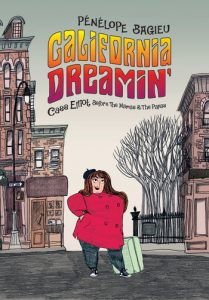
Bagieu: It’s again a child thing. I remember that we were driving in my parent’s car in the south of France. We had extremely long, boring road trips as a kid, and it was the 80s. So on my parents’ car we didn’t have our seatbelts on; my parents were smoking in the car. For some reason I think they had maybe three tapes. Not more. So we always heard the same songs over and over again for like ten hours, and their collection of the greatest hits of The Mamas and The Papas was a part of this. So I heard their songs a million times as a kid. But the fun part is I had never seen the cover of that album, and I didn’t know who they were then. To me it was a woman. It was just her because you only knew her. Then once I saw the cover and I realized there were four of them, I realized that she was fat. And that you could only see her on the cover of the image because you have the pretty, perky model and her. And she was the one with the voice. That immediately attracted me, and I wanted to know everything about her.
Her voice has always comforted me. I don’t know, there’s something about her voice that it can still move me to tears, even today. Looking the way she looked would be a hard challenge to make it in the music industry. But way back in the 60s she’s a hero because she was never anything but the fat singer from the Mamas and Papas. And she wanted to lose weight. Managers everywhere and she always told them to fuck off and just did her thing. And that was so bold, and it would still be today no matter what people say. That was the era before MTV, before music videos.
But it is true that today it would be even harder. I think that back then it’s not true that people cared only about music. I mean she had to be thin and pretty. It was terrible; I saw comedy TV shows where she was invited as a guest and all the jokes were only about the fact that she was fat. She had to go through this and smile.
She was a true icon. She had all the odds against her to get where she wanted to be.
Powell: I had heard the stories about her choking, until I read the book. Now I’ve I started to hone in on her voice, and you’re right. That’s all I hear.
Bagieu: Oh yes; her voice. You know at the end of their career they were called Cass Elliot and the Mamas and The Papas. They were marketing everything around her because she was the favorite of everyone. There was talent for songwriting with John, but the voice that people love, what makes the song California Dreamin’, what it is is her voice because if you remove her voice it’s just an annoying folk ballad with nothing. So she was a true genius. And even that choking on the sandwich thing is just plain fat shaming. She had a heart attack. She was in very, very bad health condition and she just had a heart attack. But again it is funny to imagine a sick woman dying because you choke on a sandwich so let’s just put that mythology. That is driving me crazy.
Powell: Do you have a favorite Cass Elliot song?
Bagieu: Yes I have. It’s not a favorite because depending on the times of my life; it’s revolving. But the one still working on me in a surprising, moving way is Midnight Voyage because the last minute of it is Cass, singing along. And she gives everything and her voice is like…she alternates, which I think is the strength of her voice. She keeps alternating in the middle of sentences between her child voice–because she really has the voice of the little girl at some point–and then suddenly there’s so much strengthening. And it’s heartbreaking. It tells you everything about her. It’s strong and vulnerable. It’s beautiful. I always have tears in my eyes when I listen to it, even today, and I’ve heard it a thousand times.
Powell: So what is your next book project?
Bagieu: I’m working on an adaptation of Roald Dahl’s The Witches. That should come out early 2020. I am actually working on it today because I have a very tight schedule for the book. And it’s like a dream come true. It was my favorite, favorite book as a kid. I still can’t believe the legal miracle that my publisher managed to have the rights for this. So I am super excited and I’m working closely with Luke, who is Roald Dahl’s grandson and who is the gate keeper of the spirit of the book. And who is helping me a lot not to lose this original spirit while at the same time writing it my way because I’ve always had this very precise vision of this boy and the characters in the way I pictured that. And what I would change into the story if it was me.
And so I’m really so excited to do this. I feel so privileged. They have never done any comics adaptations of Roald Dahl’s books before so I’m very, very happy.
Powell: Are there any particular artists if you want to meet this weekend?
Bagieu: Well, you mean except the ones that I’m meeting on Sunday and my panel? I just got out of a panel with Joyce Farmer, and that was so enlightening because we were discussing censorship and being underground comic artists as women. And she was telling about all the shit you have to go through writing comics in the 70s where you could get arrested. And how she created Tits and Clits, and even just the title was enough to send her to jail. She told us that she was now working on a book called Post-Menopausal Women Also Get Horny. It was so great and I felt so lucky to meet her. hat was a great panel, really. It was mostly women, but there was another Penelope; that never happened before.
There were two counties I have never seen, and it’s a very mixed and good quality diversity of authors this weekend.
Powell: I’m such a fan of yours. Thank you for sitting down with The Beat.
Bagieu: Thank you so much.


